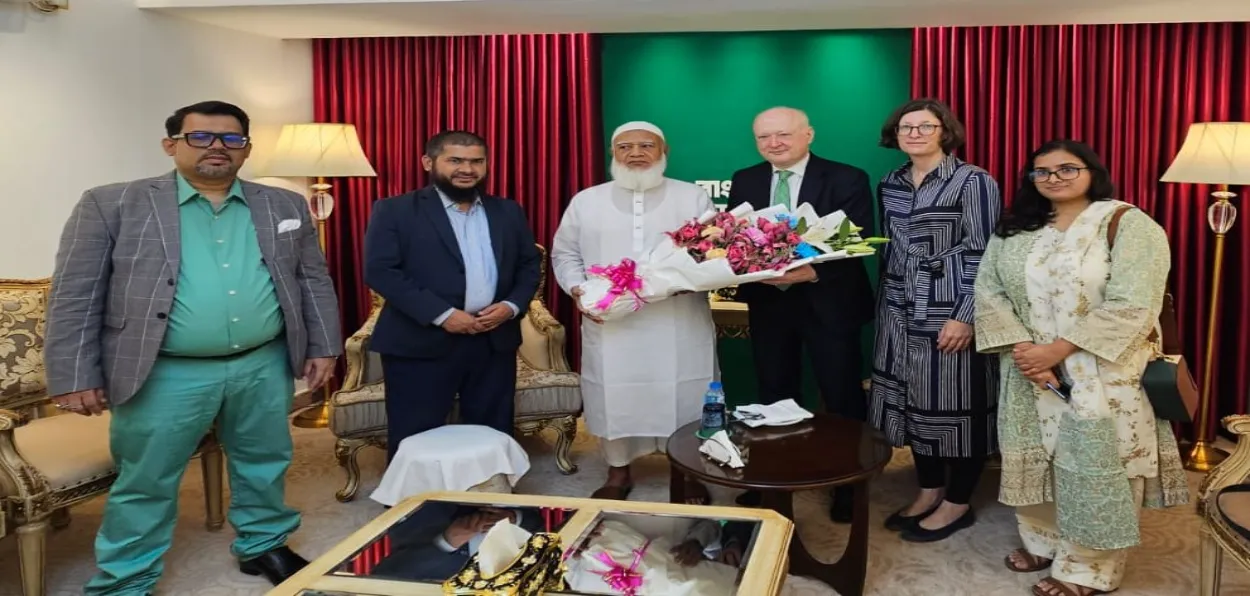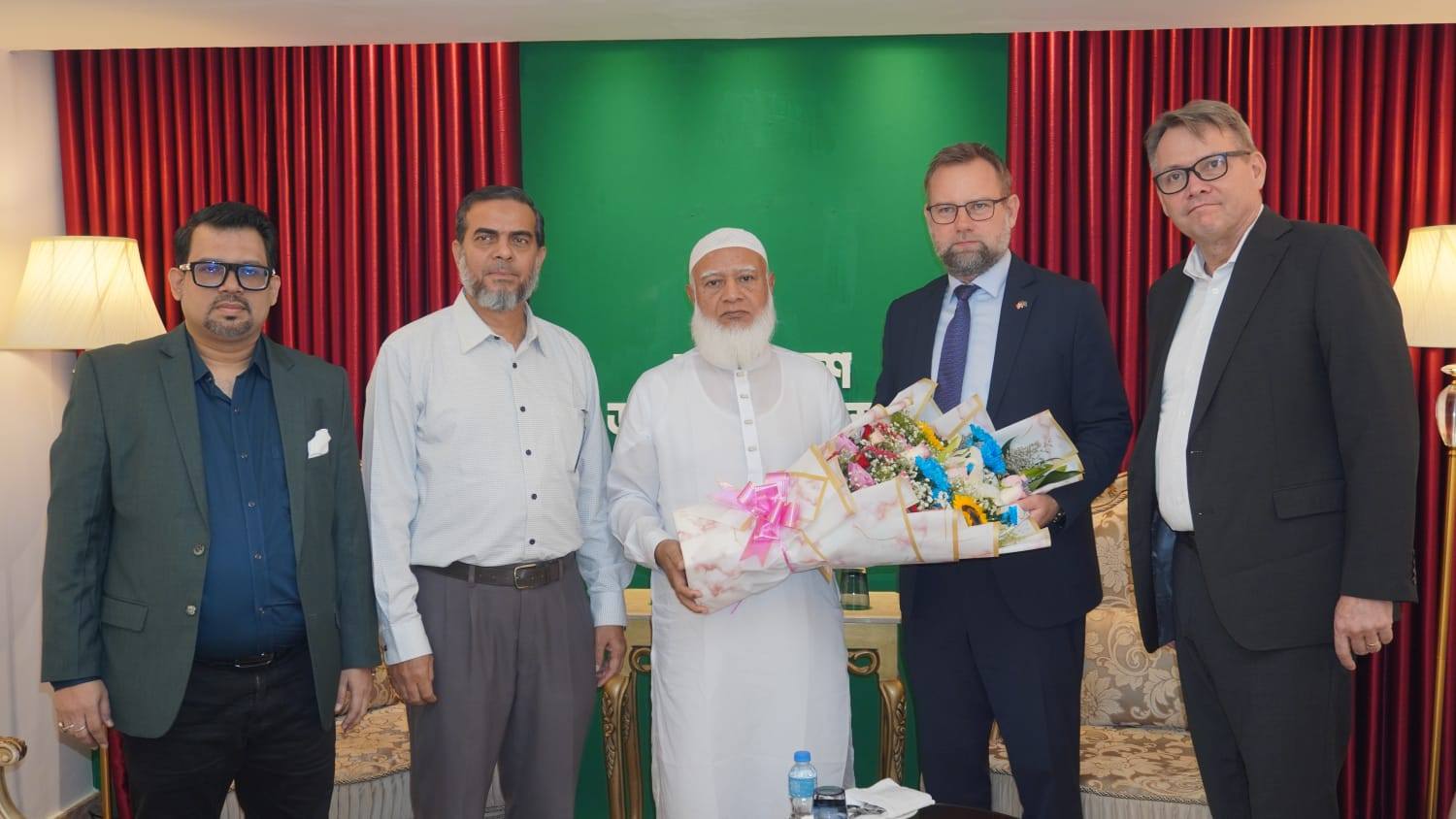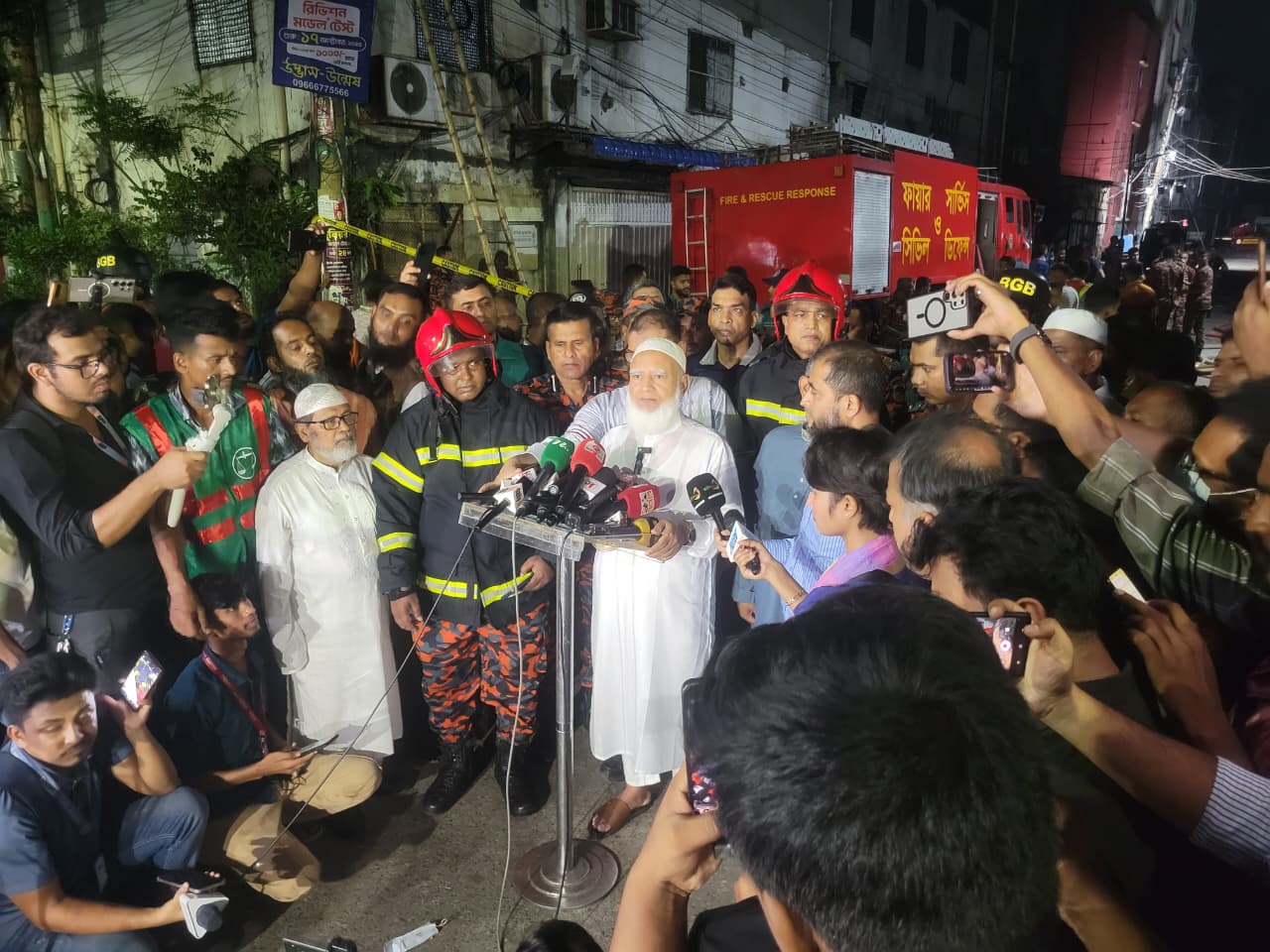
 Sanchita Bhattacharya
Sanchita Bhattacharya
Since Sheikh Hasina’s ouster on August 5, 2024, Jamaat-e-Islami (JeI) has not only unleashed itself as a formidable domestic force in Bangladesh, but also very much on the international level. As the Interim Government under Muhammad Yunus lifted the ban on JeI and its students’ wing, the Islami Chhatra Shibir (ICS), on August 28, 2024, JeI has surged to the forefront in its interactions with various foreign dignitaries, ambassadors and organisations.
Some of the latest engagements in this context include:
On October 12, newly appointed German Ambassador to Bangladesh Rüdiger Lotz paid a courtesy call on Jamaat Chief Shafiqur Rahman at his office at Dhaka's Bashundhara Residential Area. In the meeting, various issues, including the human rights situation in Bangladesh, freedom of expression, sustainable democracy, and the need to further strengthen democratic institutions, were discussed. Both sides expressed optimism that bilateral trade, investment, and economic cooperation between Bangladesh and Germany will continue to grow in the coming days.
On October 8, Algerian Ambassador to Bangladesh Abdel Wahab Saidani paid a courtesy call on JeI Chief Shafiqur Rahman in Dhaka. The dialogue focused on strengthening mutual relations between Bangladesh and Algeria, as well as the overall situation in Bangladesh.
On October 7, United Nations (UN) Resident Coordinator in Dhaka, Gwen Lewis, paid a courtesy call on JeI Chief Shafiqur Rahman in Dhaka. In the meeting, discussions were held on various issues, including the current human rights and political situation in Bangladesh, the Rohingya crisis, and upcoming national elections. At the meeting, JeI Chief described the upcoming national elections [expected in February, 2026] as 'extremely important' for Bangladesh and sought the cooperation and technical assistance of the UN to ensure that the elections are free, fair, and acceptable.
 Danish Ambassador with JeI Chief Shafiqur Rahman
Danish Ambassador with JeI Chief Shafiqur Rahman
On October 6, Ambassador of the Republic of Kosovo to Bangladesh Lulzim Pllana paid a courtesy call on JeI Chief Shafiqur Rahman. During the meeting, the envoy inquired about the health of the JeI Chief and wished him a speedy recovery. They exchanged views on the current political situation in Bangladesh as well as various issues of mutual interest,
On October 6, a JeI delegation met UK Trade Envoy Baroness Rosie Winterton, who was on a five-day visit to Dhaka. According to a press release issued by JeI's central publicity department, a six-member JeI team, led by its Deputy Chief Mujibur Rahman, met the British envoy at the UK High Commission.
On October 5, Switzerland’s Ambassador to Bangladesh, Reto Renggli, held talks with JeI Chief Shafiqur Rahman in Dhaka. They also discussed Bangladesh’s overall situation and ways to strengthen bilateral relations between the two nations. Both expressed optimism that cooperation and progress between the two countries would continue to grow in the future.
Jamaat’s global outreach is growing by the day, with formal meetings with foreign dignitaries of Argentina, Singapore, Algeria, Norway, Australia, Germany, Canada, Denmark, Japan, among others. These meetings have been instrumental in showcasing the Jamaat’s legitimacy as an important political player. Such international validation of a group with a long history of Islamist violence and collaboration in the genocide of 1971, is a matter of some concern.
Apart from these countries, China, Pakistan, Turkey, and the UK have been proactive in their respective political engagements with Jamaat and its leaders. On September 2, 2024, a courtesy meeting of Chinese Ambassador Yao Wen with Jamaat Chief Shafiqur Rahman, at Jamaat’s central office in Moghbazar, Dhaka, kicked off this procession.
This was the first visit of any diplomat to the Jamaat office since the beginning of the War Crimes Trial in March 2010. After the meeting, Yao Wen applauded Jamaat as “a disciplined party”. In addition, throughout 2025, Chinese envoys, including the Ambassador, have maintained courtesy calls and exchanges with Jamaat leaders. This pattern of outreach highlights Beijing’s resolve to engage across Bangladesh’s political spectrum, to safeguard its economic stakes, strategic projects, and diplomatic leverage.
Turkey, the United Kingdom, and Pakistan have also engaged in increasing diplomatic interaction with Jamaat-e-Islami in recent months.
Since August 2024, Pakistan’s engagement with JeI has involved several high-level diplomatic interactions. On August 23, 2025, Pakistan Deputy Prime Minister and Foreign Minister Ishaq Dar, during a visit to Dhaka, met a JeI delegation led by Deputy Chief Syed Abdullah Muhammad Taher at the Pakistan High Commission.
 JeI Bangladesh chief Shafiqur Rehman addressing people in Mirpur
JeI Bangladesh chief Shafiqur Rehman addressing people in MirpurIn a separate but related gesture, on August 24, Dar visited Jamaat Chief Rahman at his residence, inquiring about his health and conveying best wishes, accompanied by senior Pakistani officials. These visits have been framed by both sides in terms of reviving cooperation based on mutual respect and shared interests. From the Jamaat’s side, issues discussed include unresolved historical matters between Bangladesh and Pakistan, and the upcoming national elections in Bangladesh.
Pakistan’s public statements during these interactions emphasise respect for Jamaat’s resilience and suggest that Pakistan is committed to keeping open diplomatic and people-to-people channels, possibly to influence outcomes or build goodwill ahead of future political realignments.
Jamaat leaders have also travelled abroad to various countries. On November 27, 2024, a delegation comprising leaders of JeI, ICS, and four other Islamic parties departed for their first time visit to China. The 14-member team was led by JeI’s Deputy Chief Syed Abdullah Mohammad Taher. Earlier, Jamaat Chief Shafiqur Rahman visited the United Kingdom in what party sources described as a “community outreach and organisational strengthening” mission. During the trip, he met members of the Bangladeshi Diaspora in London, Birmingham, and Luton, emphasising internal coordination and the need for political mobilisation abroad in support of Jamaat’s agenda within Bangladesh.
On September 21, 2025, Taher travelled to the United States as part of a delegation accompanying Muhammad Yunus to attend the 80th session of the UN General Assembly. Taher was received by expatriate Bangladeshi communities in New York and spoke at community events while in the United States.
It is astonishing to witness international players negotiating and exchanging views with an Islamist organisation, 50 of whose leaders have been indicted by the International Crimes Tribunal (ICT) for War crimes committed during the 1971 Liberation War. Among these, prominent leaders of Jamaat were also convicted and hanged, including JeI politician Abdul Quader Mollah (hanged in 2013), Ameer Matiur Rahman Nizami (hanged in 2016) and Secretary General Ali Ahsan Mujaheed (hanged in 2015). Ghulam Azam was sentenced to 90 years in prison, while Delawar Hossain Sayedee’s death sentence was commuted to life imprisonment. Both died while serving jail terms.
The current interactions, while officially framed as routine diplomacy, indicate growing foreign recognition of Jamaat as a central political stakeholder in Bangladesh’s evolving landscape.
ALSO READ: Jamaat's rise may lead Bangladesh to path of radicalisation
A systematic and gradual ingress of Jamaat has occurred since August 2025, into the political sphere in Bangladesh, with the tacit approval of Muhammad Yunus’s Interim Government. Jamaat’s growing clout in the foreign policy of a disturbed and chaotic country should concern the world. The ever-increasing recognition of Jamaat as a political actor by various foreign countries will have far-reaching repercussions on the already dwindling democratic structure in Bangladesh.
Sanchita Bhattacharya is a Research Fellow the Institute for Conflict Management.
[This article was originally published by South Asia Intelligence Review at https://www.satp.org/south asia-intelligence-review-Volume-24-No-17 on October 13, 2025] It has been slightly edited for brevity.
